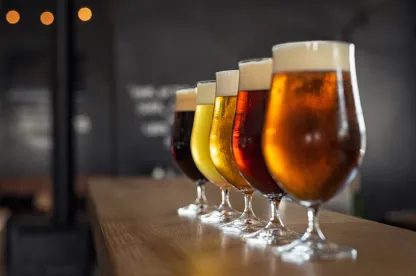On Monday the Supreme Court addressed—or, perhaps more to the point, chose not to address—an issue close to the hearts of many in the midst of a pandemic: home delivery of fine wine and spirits. The Court declined to review the Sixth Circuit’s decision in Lebamoff v. Whitmer, which upheld the State of Michigan’s alcohol delivery laws in the face of a dormant Commerce Clause challenge.
Like many states, Michigan employs a “three-tier system” for alcohol distribution. State-licensed alcohol producers and manufacturers (first tier) sell their products to licensed wholesalers (second tier), who in turn distribute the product to licensed retailers (third tier). Participants in each tier are heavily regulated by the State, which retains the authority to impose price controls, taxes, and other health-and-safety regulations. By requiring all alcohol entering the State to pass through this three-tier system, Michigan ultimately controls the amount of alcohol sold within its borders.
In 2016 Michigan enacted a statute permitting licensed retailers (the third tier) to offer home delivery. While consumers undoubtedly welcomed this development (particularly on those harsh winter weekends when they were facing—and losing to—the Ohio State Buckeyes), retailers in neighboring states apparently were not impressed. An Indiana retailer, Lebamoff Enterprises, sued the State, arguing that the statute violated the dormant Commerce Clause by allowing in-state—but not out-of-state—retailers to deliver alcohol to Michigan residents.
The Sixth Circuit rejected Lebamoff’s argument this past April, holding that the statute was a valid exercise of the State’s authority to regulate the importation of alcohol under the Twenty-first Amendment. Writing for the Court, Judge Sutton explained that “when faced with a dormant Commerce Clause challenge to an alcohol regulation,” the relevant question is simply “whether the law can be justified as a public health and safety measure or on some other legitimate nonprotectionist ground.” Michigan’s decision to limit home delivery to licensed retailers readily satisfied that test, as it ensured such sales would continue to take place within the three-tier system (i.e., from a licensed retailer who purchased the product from a licensed wholesaler). Plaintiff’s alternative, on the other hand, would “create a sizeable hole in the three-tier system” by allowing alcohol into the State that “passes through out-of-state wholesalers or for that matter no wholesaler at all.” As Judge Sutton pointed out, the difference is not merely theoretical. States impose vastly different levels of taxation and regulatory burden on the wholesale tier. Allowing out-of-state liquor into the State without passing through Michigan’s wholesale tier “leaves too much room for out-of-state retailers to undercut local prices and to escape the State’s interests in limiting consumption.”
For those with an interest in alcohol control law and the Twenty-first Amendment, the full opinion is definitely worth a read. The Supreme Court’s decision to deny certiorari ensures that the standards described in the opinion will continue to govern similar challenges in the Sixth Circuit.





 />i
/>i

